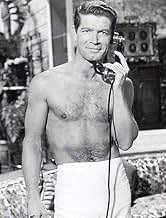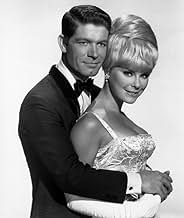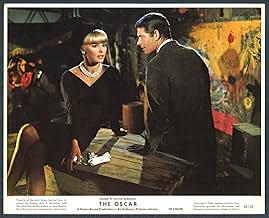Ajouter une intrigue dans votre langueArrogant Hollywood actor Frankie Fane is nominated for the Best Actor Academy Award. His friend Hymie Kelly recalls their life together, Frankie's ruthless struggle to the top, and the peopl... Tout lireArrogant Hollywood actor Frankie Fane is nominated for the Best Actor Academy Award. His friend Hymie Kelly recalls their life together, Frankie's ruthless struggle to the top, and the people Frankie has used and abused to get there.Arrogant Hollywood actor Frankie Fane is nominated for the Best Actor Academy Award. His friend Hymie Kelly recalls their life together, Frankie's ruthless struggle to the top, and the people Frankie has used and abused to get there.
- Réalisation
- Scénario
- Casting principal
- Nommé pour 2 Oscars
- 3 nominations au total
Avis à la une
This really goes to the point that nobody in this film seemed to know or care about the process of making it and were more enamored with the concept of setting their film on Oscar Night than in having the story make any sense, and were more about getting names to list, hoping to increase the Box Office receipts. Bad move.
I was hoping for an over the top, completely ridiculous, scenery chewing melodrama, and I was rather disappointed. Granted, Stephen Boyd definitely does have some ludicrous dialog and plays bigger than he should for what he's doing, but it really isn't "fun" to watch. Even more to the point, there's no one in the film who can challenge him.
Milton Berle comes the closest as his agent. But Berle doesn't get to crack wise, as we would expect him to do with a knucklehead client like this one. He plays it straight up. What was the point of that? And Elke Sommer is such a conflicted character, it's difficult to understand what she brought to the film, aside from the obvious eye candy intended.
The other oddity is in seeing Tony Bennett play his one and only acting role. Clearly, he wasn't ready for this sort of challenge and I can't blame him for begging off film for the safety of his music career after this disaster.
Wasted were Oscar Winner Ernest Borgnine who plays some two bit private eye and Edie Adams who actually seems the most realistic character in the entire film. Also, Edith Head, the multiple Oscar winning Costume Designer, who was seen on screen in three different scenes, and uttered half a word.
But I'm seriously still reeling over the credit spoilers. If you do watch this film (and I don't recommend you do because it definitely isn't good and it unfortunately isn't bad enough to be amusing) don't read the opening credits!
In the same vein as "Valley of the Dolls", it's a camp classic about Hollywood. It paints Hollywood as full of vicious amoral people, but the worst of them is Frankie Fane (Stephen Boyd). The film starts at the Academy Awards where Frankie Fane is expecting to win the Best Actor Oscar, which he needs to get back on top. The film then traces his rise in Hollywood, a rise that is full of him stepping on other people. There are tons of Hollywood stereotypes and situations in the process.
But along the way he meets an actor who has aged out of leading parts and has suddenly been labeled box office poison and has to take a job as head waiter where his old Hollywood pals eat because he has also ran through all of his money. Frankie is terrified of becoming that guy, and yet he oddly does everything he can to become just that guy. He uses people and discards them, and he also spends like there is no tomorrow. And then tomorrow comes. Complications ensue.
It's too bad Boyd isn't better remembered today for roles other than that of Messala in Ben Hur, because he really was a very good actor. He takes a part that could have been quite two dimensional and breathes some life into it so that his character is a very believable and hissable villain.
The Oscar isn't any worse than 75% of the films of the era. --Or today, when you get down to it. In that day, an all-star cast was employed to conceal all inadequacies; these days, CGI fulfills the very same function. I get it. A lot of people don't, simply because CGI is so big and bombastic by its very nature as to overwhelm judgment. Another fifty years from now, I think there are going to be lots of films like The Oscar, films that people laugh at because they have nothing going for them but an obvious patch meant to cover their weakness. You can bet on it.
The film is built around three male roles, with everyone else more or less stepping out of their way for the big acting moments given to them. Boyd, always the stony-jawed, steely-eyed manly male actor, is exactly as you remember him. Tony Bennett does a really nice job, which is a pity, given this films negative rep. Milton Berle was a surprisingly good dramatic actor, and proved it in many films and TV shows, just like this one. Eleanor Parker rises above the secondary status to which the actresses in this film are consigned. She makes the development from haughty to pathetic entirely credible.
Bottom line: Enjoy it as a chance to see names, names, names, even if you don't buy the drama or the story. It comes straight from the heart of the last demi golden age, just past the decline and disappearance of The Golden Age of Hollywood. It commemorates this unique time and place as well as any film.
Le saviez-vous
- AnecdotesThis was the only film in which Tony Bennett played a fictional character. In his autobiography, "The Good Life," he states that it was a terrible experience and he never sought future roles. This picture marked his screen debut.
- GaffesThe newspaper photos of Cheryl Barker hitting Frankie don't match the scene when it happens. She could have hit him twice (she was angry enough), and the photographers might have caught the second hit.
- Citations
Hymie Kelly: [narrating] Frankie wanted the town to be aware he was alive and he knew how to do it. Man, he wanted to swallow Hollywood like a cat with a canary. And he did it. The parts got bigger, and Frankie was hooked. Like a junkie shooting pure quicksilver into his veins. Frankie got turned on the wildest narcotic known to mortal man: Success. And he needed larger and larger doses. As the years went by, it became part of his life like air. The attention, the recognition. Now he was somebody. He was always too hungry. Too much and too far ahead of himself. He bought a Rolls before he could afford it. He bought the mansion in Bel Air. He went the route. The interiors were from the best shops on decorators row. Even Sam the houseboy was imported. Frankie played the part for real, the whole image. He had arrived.
- ConnexionsEdited from The 37th Annual Academy Awards (1965)
- Bandes originalesThanks for the Memory
by Leo Robin and Ralph Rainger
Meilleurs choix
- How long is The Oscar?Alimenté par Alexa
Détails
Box-office
- Budget
- 3 000 000 $US (estimé)
- Durée1 heure 59 minutes
- Rapport de forme
- 1.66 : 1
Contribuer à cette page







































